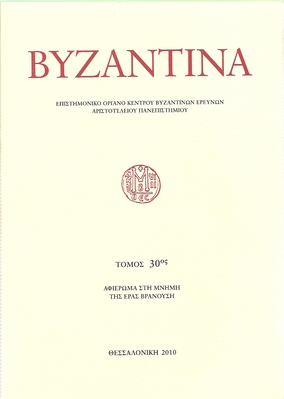Πολιτάρχης και πολιταρχία στα θαύματα του Αγίου Δημητρίου και σε άλλες βυζαντινές πηγές
Part of : Βυζαντινά : επιστημονικόν όργανον Κέντρου Βυζαντινών Ερευνών Φιλοσοφικής Σχολής Αριστοτελείου Πανεπιστημίου ; Vol.27, No.1, 2007, pages 165-185
Issue:
Pages:
165-185
Parallel Title:
Politarch and politarchia in the miracles of St. Demetrius and in other byzantine sources
Author:
Abstract:
The politarcbs were civic magistrates in the ancient greek cities with administrative and police duties, according to inscriptions found in Macedonia and other regions (2nd c. B.C. - 3rd c. A.D). The terms politarch and politarchia survived in the byzantine sources from the 4th to the 14th centuries. They were used to designate the leaders of the cities in general, the officials of the state and even the Byzantine emperor, but not in the technical meaning of the ancient civic magistrates.A politarch mentioned in the Miracles of St. Demetrius is considered, according to a recently expressed view, as a civic magistrate of Thessalonike. In my opinion however, the politarch is identified with the eparch of the city (Constantinople), as it can be demonstrated by the interpretation of the relevant passage (P. Lemerle, Miracles I. I. 210.3-8). In addition, I suggest that the phrase τους των πρακτόρων πράκτορας should be corrected as τούς των πραιτωρίων or τού πραιτωρίου πράκτορας. The Praetorion was the seat of the eparch of the city, where a prison was also located. In this case the praktores were not tax collectors but probably the subordinate police agents of the eparch of the city, whose office was in charge of keeping public order in the capital. The identification of the politarch mentioned in the Miracles of St. Demetrius with the eparch of the city, could also be reinforced by the fact that Michael Choniates designate the eparch of the city Michael Belissariotes as politarch.
Subject:
Subject (LC):
Notes:
Το άρθρο περιέχεται στο αφιέρωμα στη μνήμη της Έλλης Πελεκανίδου




